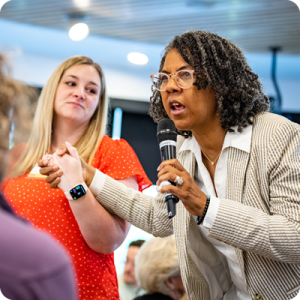
Last week, Lifeworks hosted a first event of its kind. Listen. EDUCATE. Navigate.™ A Conversation on Disability Inclusion, kicked off at 7:30 am on Wednesday, June 7. Attendees enjoyed a catered breakfast from Breaking Bread as they tuned in to stories from people with disabilities and disability advocates from the community.
“I’m tired of talking about [disability inclusion]. I’m a doer,” said Dr. Verna Price, internationally renowned human potential and leadership expert. As a mother to a son with disabilities, Dr. Price touched on the joys she has experienced. She shared the ways in which people with disabilities enrich our lives, and urged listeners to use their privilege to uplift others whenever possible.
“Don’t leave anyone behind, always remember to take somebody with you,” Dr. Price said.
Although anyone can face social and economic challenges, people with disabilities often experience a compounded effect due to social stigmas. According to the World Bank, people with disabilities are more likely to experience unemployment as a result of discrimination, which increases their risk of poverty, homelessness, and malnutrition. The breakfast on Wednesday shed light on some of these challenges and sparked a conversation about disability inclusion and allyship.
 Three individuals with disabilities had the opportunity to share their stories with the audience during a moderated panel discussion. Said Shaiye, a Minneapolis-based Somali writer and photographer, said that it often is not “obvious” to people that he lives with a disability, and so it can be difficult for him to get the accommodations he needs in public spaces. He emphasized the importance of being inclusive of others’ needs, whether or not they “appear” to have a disability or not.
Three individuals with disabilities had the opportunity to share their stories with the audience during a moderated panel discussion. Said Shaiye, a Minneapolis-based Somali writer and photographer, said that it often is not “obvious” to people that he lives with a disability, and so it can be difficult for him to get the accommodations he needs in public spaces. He emphasized the importance of being inclusive of others’ needs, whether or not they “appear” to have a disability or not.
“It’s dehumanizing having to tell people to include you all the time,” Shaiye said. “I think it’s important to have respect for everyone regardless of what they look like, and to not make assumptions.”
Kiesha Murray, a mother and aspiring comedian, reiterated the sentiments shared by Shaiye. She also shared some of the ways that public spaces exclude people with disabilities, from limited accessible accommodation options to non-inclusive conversations. Murray believes that for significant change to occur, it’s important for people to shift their perspectives.
“People with disabilities are often left out of the conversation,” Murray said. “It’s important for us to always be thinking about how we can bring others along.”
The final panelist, Carlos Salas Guzman, shared some of his experiences with social isolation. He said he often feels ignored when attempting to converse with people in the community. Disheartened by this treatment, he encouraged listeners to remember to be inclusive by extending common courtesy to everyone, regardless of how they look, speak, or behave.
“It makes me sad [to be ignored]” Guzman said. “So when you see someone, please say hello.”
After listening to the panelists’ stories, attendees had the opportunity to engage in small group breakout sessions. One woman, whose son lives with a disability, said that she often does not bring him to events in fear that he may behave in ways deemed “inappropriate” by attendees. But after reflecting on the panel discussions, she realized “hiding him away” may be hindering a crucial opportunity to foster disability inclusion.
“This discussion showed me that the unique way my son shows up in the world is okay, and not something to hide, but something to embrace and allow people to experience,”she said.
View photos from the event here.
If you’re interested in learning more about disability inclusion and want to partner with Lifeworks, please contact Lauren Brutger at lbrutger@lifeworks.org.
